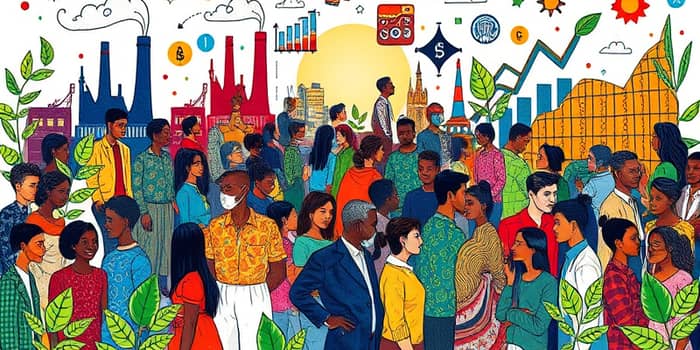
Capitalism has driven extraordinary progress over centuries, lifting billions from poverty and fostering innovation. Yet today it stands at a crossroads, tested by inequality, environmental strains, and social discontent. In this article, we explore the system’s historical triumphs, contemporary challenges, and the bold reforms needed to ensure a sustainable, inclusive future.
Since 1820, market economies have reshaped the world. A thirteen-fold increase in global GDP per person has translated into unprecedented standards of living. In the United States alone, per-capita GDP soared about thirty-five-fold, fueling mass education, healthcare advances, and technological leaps.
During the twentieth century—especially after World War II—capitalist nations experienced unprecedented wealth explosions wherever adopted. Correspondingly, extreme poverty plummeted from 79% to 9% globally, showcasing the system’s power to elevate human wellbeing.
Yet recent shocks—the 2008 Financial Crisis and the COVID-19 pandemic—exposed deep vulnerabilities. Growth has slowed in many mature economies, and public trust in unfettered markets has waned.
Inequality has surged: CEO-to-worker pay ratios have ballooned, and 35.9 million Americans lived in poverty in 2024. Wealth concentration risks undermining the moral legitimacy of market systems and fueling social unrest.
Meanwhile, capitalism’s emphasis on extraction and consumption has strained ecosystems. GDP metrics fail to capture biodiversity loss, carbon emissions, or community wellbeing, leading to policies that prioritize short-term output over long-term health.
In the digital era, technology giants dominate markets, reinforcing existing divides. Algorithmic biases in hiring, lending, and healthcare lock vulnerable groups into disadvantage, while profits soar for those who control data.
Young people especially skeptical about capitalism have shifted the debate: favorable views among U.S. adults aged 18–29 fell from 68% in 2010 to 45% in 2018. High education and housing costs, combined with stagnant wages, drive calls for systemic change.
Globalization’s advocates now face a backlash as supply-chain fragility and trade disputes prompt protectionist responses. The old promise of open markets clashes with rising nationalism and economic insecurity.
Thought leaders argue that without serious reform, capitalism risks moral and social collapse. Critics like Paul Collier describe it as “morally bankrupt and on track for tragedy,” while others highlight market myths that obscure real human needs.
Philosophical critiques warn of a “post-truth” economy, where financialization breeds speculative bubbles and erodes social solidarity. Addressing these systemic “glitches” is essential to restore trust and empower democratic action.
In response, alternative frameworks—solidarity economies, wellbeing economies, and community cooperatives—offer inspiring models. They emphasize shared purpose, equitable distribution, and local resilience.
Scholars and policymakers propose multi-dimensional reforms to realign capitalism with social and environmental goals. A key step is the shift from GDP to wellbeing as success, adopting metrics that capture health, education, and ecological resilience.
Accessible education, affordable healthcare, and sustainable housing policies are critical to rebuild trust among younger generations. Public investment in green infrastructure and social enterprises can generate jobs while reducing carbon footprints.
Capitalism’s destiny depends on collective choices. With bold reforms, it can evolve into a system that balances profit with purpose, nurturing communities and safeguarding the planet. Without change, we risk deepening divides and ecological collapse.
Several scenarios lie ahead: a reimagined global market anchored in solidarity and wellbeing; localized economies prioritizing circularity and degrowth; or a dystopian landscape of entrenched inequality if reform stalls.
The interplay of generational values, technological trends, and political will will shape the path forward. By embracing inclusive innovation, rigorous regulation, and shared prosperity, society can forge a resilient capitalism fit for the twenty-first century.
References





